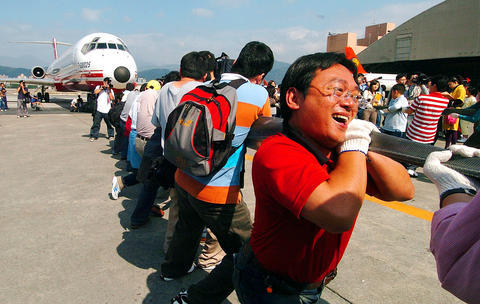Do you know how many people it takes to pull a MD-83 model passenger jet -- one equipped with 143 passenger seats and weighing 45 tonnes?
Thousands of people were eager to find out the answer yesterday morning as they gathered at a facility near the Taipei Songshan Airport to witness the potentially record-setting event.
The move was part of festivities organized by Far Eastern Air Transport Corp (

PHOTO: CHIEN JUNG-FUNG, TAIPEI TIMES
To encourage participation from the public, the company held an online quiz asking people to guess the number of people needed to move the airplane. The company later invited some of the respondents to participate in the event.
At first, fifteen participants were invited to try to pull the airplane. After they failed, another 10 people were added to the team. Again they failed.
After the third try, five people were added at a time. Eventually, the passenger jet moved 5m when pulled by a total of 50 people.
Far Eastern employees, led by chairman Mike Lo (樂大信), also formed a team to pull the airplane. Following the same set of rules, the Far Eastern team was able to pull the airplane with only 40 people.
A man surnamed Kan (
"Apparently, we are too weak," he said.
After his team accomplished the feat, Lo said that it is quite tiring to pull because it is difficult to hold the rope firmly. He said that he had thought that 10 people would be enough to pull the airplane.
Lo, however, is ready to take on another challenge.
"Maybe a Boeing 757," he said.
Yet, the biggest challenge Far Eastern is facing in its 50-year history is a shrinking domestic market and the launch of the high speed rail service.
The carrier said yesterday that it was evaluating the possibility of canceling all flights between Taipei and Tainan as the route has suffered continuous losses since the high speed rail opened in January.
Far Eastern president Philip Chen (陳尚群) said they hoped the flights to Tainan could end as soon as possible, though the proposal would need Civil Aeronautics Administration (CAA) approval.
On average Taipei-Tainan flights are only 30 percent full.
This month, the company decided to reduce Taipei-Tainan flights from three to two per day.
Hanson Chang (
However, they reacted warmly to the discount offered for the Taipei-Kaohsiung flights, he said.
Should the situation get worse, the company might even consider cutting the Taipei-Tainan flights to one a day during the Lunar New Year holidays next year, Chang said.
Chang said the operation of the Taipei-Tainan flights may continue if the airport in Tainan could be expanded into an international airport.
Even though the sale of the Taipei-Kaohsiung tickets is going well, Chang said it is only "a matter of time" before they withdraw completely from the domestic airline market.
Seventy percent of the company's revenue is now earned through international flights, Chang said.
Chang also said that it is planning to provide one daily flight to Borneo starting in January.

Taiwan’s technology protection rules prohibits Taiwan Semiconductor Manufacturing Co (TSMC, 台積電) from producing 2-nanometer chips abroad, so the company must keep its most cutting-edge technology at home, Minister of Economic Affairs J.W. Kuo (郭智輝) said yesterday. Kuo made the remarks in response to concerns that TSMC might be forced to produce advanced 2-nanometer chips at its fabs in Arizona ahead of schedule after former US president Donald Trump was re-elected as the next US president on Tuesday. “Since Taiwan has related regulations to protect its own technologies, TSMC cannot produce 2-nanometer chips overseas currently,” Kuo said at a meeting of the legislature’s

GEOPOLITICAL ISSUES? The economics ministry said that political factors should not affect supply chains linking global satellite firms and Taiwanese manufacturers Elon Musk’s Space Exploration Technologies Corp (SpaceX) asked Taiwanese suppliers to transfer manufacturing out of Taiwan, leading to some relocating portions of their supply chain, according to sources employed by and close to the equipment makers and corporate documents. A source at a company that is one of the numerous subcontractors that provide components for SpaceX’s Starlink satellite Internet products said that SpaceX asked their manufacturers to produce outside of Taiwan because of geopolitical risks, pushing at least one to move production to Vietnam. A second source who collaborates with Taiwanese satellite component makers in the nation said that suppliers were directly

Top Taiwanese officials yesterday moved to ease concern about the potential fallout of Donald Trump’s return to the White House, making a case that the technology restrictions promised by the former US president against China would outweigh the risks to the island. The prospect of Trump’s victory in this week’s election is a worry for Taipei given the Republican nominee in the past cast doubt over the US commitment to defend it from Beijing. But other policies championed by Trump toward China hold some appeal for Taiwan. National Development Council Minister Paul Liu (劉鏡清) described the proposed technology curbs as potentially having

EXPORT CONTROLS: US lawmakers have grown more concerned that the US Department of Commerce might not be aggressively enforcing its chip restrictions The US on Friday said it imposed a US$500,000 penalty on New York-based GlobalFoundries Inc, the world’s third-largest contract chipmaker, for shipping chips without authorization to an affiliate of blacklisted Chinese chipmaker Semiconductor Manufacturing International Corp (SMIC, 中芯). The US Department of Commerce in a statement said GlobalFoundries sent 74 shipments worth US$17.1 million to SJ Semiconductor Corp (盛合晶微半導體), an affiliate of SMIC, without seeking a license. Both SMIC and SJ Semiconductor were added to the department’s trade restriction Entity List in 2020 over SMIC’s alleged ties to the Chinese military-industrial complex. SMIC has denied wrongdoing. Exports to firms on the list